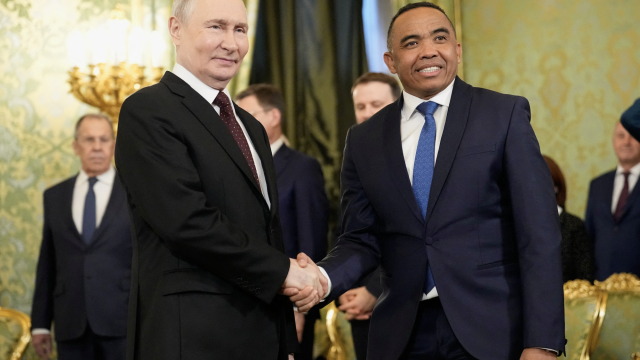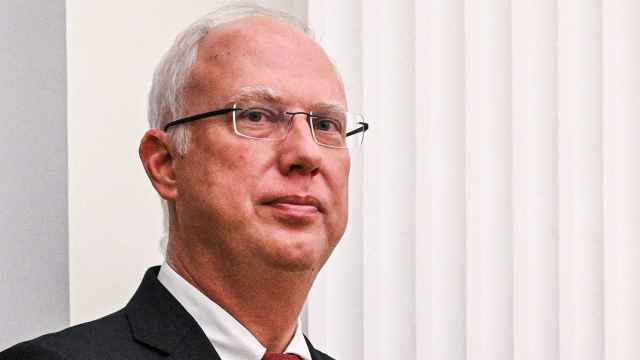At first glance, Google Russia's 2,600-square-meter headquarters in Moscow appears more like an entertainment center than an office.
On the fourth floor of the Balchug Plaza building, mustard-colored plaid couches and a mini pool table are placed near the lobby. Balls of yarn sit atop a brick desk embedded with the company's logo and inspired by the Kremlin wall.
Nearby, employees are playing ping-pong while another worker is hooking up his laptop to a Google Earth contraption. Consisting of eight vertical televisions, the device allows him to view Earth, Mars or the moon from an aerial perspective.
Down the corridor from the entrance, there is a relaxation room featuring textured walls, dim lighting and a leather massage chair.
Google believes that such an unconventional office environment helps employees come up with innovative ideas.
"A variety of different work spaces is crucial for productivity," said the headquarters' designer, Tanya Ruegg, who works at Swiss architecture firm Camenzind Evolution. "And engineers are freaks and geeks; they've got a different mindset. The Google playground makes them more creative."
The Balchug Plaza space costs about $900 per square meter a year to rent already, but there is a return on the investment.
"What Google invests is nothing compared to the profits they get back," Ruegg said.
Employees were involved in the planning of their office, which includes foosball, chess, a library, video games like Guitar Hero, unlimited snacks and drinks, a popcorn machine, and an electronic instrument set. Workers can have free breakfast, lunch and dinner daily and yoga classes twice a week and can shower in one of the office's bathrooms.
"It looks like we are not doing work at all, but that's not the case. The goals set out by the company are challenging, and you have to divert most of your time to meeting them," said Google Moscow communications manager Inessa Roman-Pogorzhelskaya.
Sleeping couches are scattered throughout the office and are usually used by workers after conference calls to different time zones. A manicurist, masseuse and nutritionist are also on premises.
"People are motivated by space," Ruegg said. "So we let our employees choose what defines their culture. There was no forcing of a vision."
Ruegg said Google's approach to office space created a unique emotional atmosphere for employees.
"Creativity rises in an emotionally accentuated space, more so than one with high functional levels with expensive printers, scanners, projectors and gadgetry," Ruegg said. "Actually, most Googlers would rather have an expensive coffee machine than expensive desks," she said.
Creativity in office surroundings transfers to innovation in the workforce, according to corporate development and human management research institutions Fraunhofer IAO, IAT University Stuttgart and the University of Exeter.
Dynamic workspaces also promote retention and engagement patterns for younger employees, they said.
IAT University Stuttgart concluded that only 4 percent of creativity occurs at a desk space, while the University of Exeter said that being part of the design process of your own work environment increases happiness, health and productivity.
In classic Silicon Valley tradition, Google was born in a garage in 1998, but today there are in excess of 70 offices in more than 40 countries around the world.
Google Moscow has about 100 employees working in engineering, sales, marketing, public relations, finance, legal, human resources and facilities departments.
Google Moscow's headquarters has 12 meeting rooms. Each is named for a cartoon character — for example, Karlson, 38 Parrots, Winnie the Pooh and the Frog Princess — and is decorated in corresponding fashion.
The Winnie the Pooh room, for instance, features printed carpets, stuffed animals and wallpaper with bee images.
"In order for Google employees to be psychologically fulfilled, they require visually oriented spaces. The environment has to tell a story," Ruegg said.
One of the office's cafes was inspired by Lukomorye, a Russian fairy-tale forest.
The office "had to have a Russian soul, a strong local identity, but without the matryoshkas, balalaikas, bears or cliches," Roman-Pogorzhelskaya said. "We wanted nostalgia for the office to bring up childhood memories, so we are all united by what we watched and read in the Soviet era. Our fairy tales differentiate us from the rest of the world."
Google Moscow's design was a result of equal contributions from employees and designers, Ruegg said.
To carry out the design process, research on labor psychology and emotional fulfillment was conducted through workshops, interviews, neurolinguistic programming and employee wish lists, she said.
Maria Torbina, the facilities manager for Google Russia and Ukraine, said Google gets regular feedback from its staff.
"Once every two weeks, we have brainstorming sessions where employees can voice complaints or suggestions about food, social life, practically anything," she said.
Before London-based catering company Eurest was picked to supply food to the office, about 10 Google workers, one representing each department, tested food for several hours and filled out a questionnaire.
Local suppliers, such as a Russian monastery, also contributed to the office design. The buffet is named Samobranka, after a magic tablecloth that serves meals when told to do so, and its tiles were crafted by monks.
Google Russia's peers include search engine Yandex and e-mail provider Mail.ru.
Though Yandex's office space lacks the extravagance of Google's, it still has the quirkiness expected from a high-tech startup.
The company's Moscow office, on Ulitsa Lva Tolstogo, sports a hammock, library, pool and ping-pong table and a retro orange television hanging from the ceiling. There are also plant-covered walls and lounge areas.
Mail.ru's office, on Leningradsky Prospekt, is more conventional, featuring a standardized office kitchen and lounges.
Russian tech giants are following a global trend. In the United States, AOL and Pixar have similarly unusual workspaces, which are not just functional and ergonomic.
The product development firm Davidson placed its desks on a toy racetrack, inside a gingerbread house and at the top of a treehouse. Another one of Davidson's office spaces looks like a pirate ship. A one-eyed plastic captain glares at its crew from behind a wheel, and barrels and wooden planks are used as desks.
Swedish Internet provider Bahnhof created its offices to resemble a cavernous bomb shelter.
Related articles:
A Message from The Moscow Times:
Dear readers,
We are facing unprecedented challenges. Russia's Prosecutor General's Office has designated The Moscow Times as an "undesirable" organization, criminalizing our work and putting our staff at risk of prosecution. This follows our earlier unjust labeling as a "foreign agent."
These actions are direct attempts to silence independent journalism in Russia. The authorities claim our work "discredits the decisions of the Russian leadership." We see things differently: we strive to provide accurate, unbiased reporting on Russia.
We, the journalists of The Moscow Times, refuse to be silenced. But to continue our work, we need your help.
Your support, no matter how small, makes a world of difference. If you can, please support us monthly starting from just $2. It's quick to set up, and every contribution makes a significant impact.
By supporting The Moscow Times, you're defending open, independent journalism in the face of repression. Thank you for standing with us.
Remind me later.






